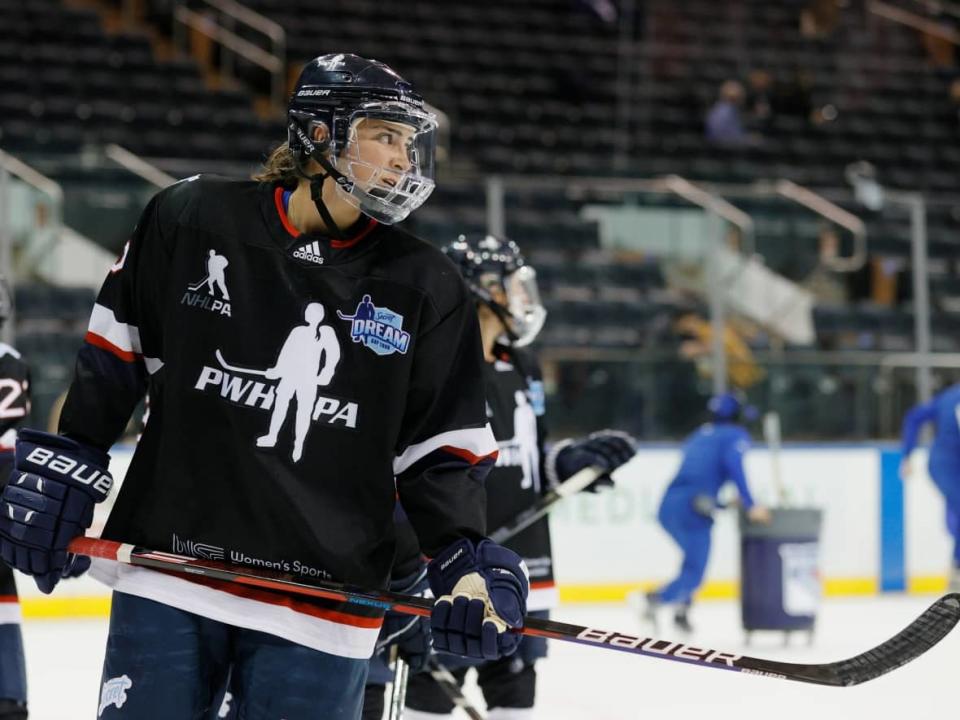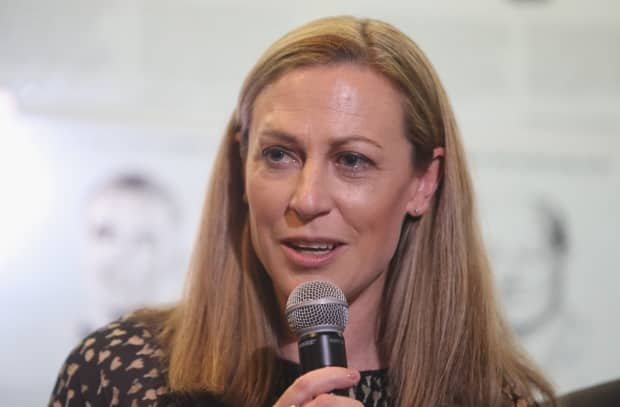How women affected by oppression within hockey are fostering change

This is a column by Shireen Ahmed, who writes opinion for CBC Sports. For more information about CBC's Opinion section, please see the FAQ.
A few years ago, I was on Twitter and saw a tweet from the Professional Women's Hockey Players Association (PWHPA) that showed them wearing helmet decals with land acknowledgements on them for the showcase locations and for where they train.
I was intrigued and a little surprised by this gesture — arguably not done before in hockey. The decals were designed by Indigenous artists. I knew that the players from the PWHPA were engaging in anti-racism learning with Dr. Courtney Szto. Szto is a close friend and someone I have dubbed "the most brilliant hockey mind in Canada."
Her work as the managing editor of Hockey in Society has been instrumental in providing critical analysis of the happenings in the hockey ecosystem.
I asked her about the origins of the decals and she gave me some information about how and when they came to be. I found out that the decals were the idea of U.S. hockey superstar Kendall Coyne Schofield. It struck me as poignant considering a few years earlier Coyne Schofield criticized Colin Kaepernick for kneeling.
Shortly after George Floyd's murder, Coyne Schofield — who is part of the PWHPA — tweeted that she was wrong for taking that position and that she was committed to learning. This was of her own accord. No team or league told her to say it.
I believe in the power of "un-learning" to affect lives and sports, but as a journalist I was even more curious about how it had happened and how it was going. That brought me back to Dr. Szto.
I first met Dr. Szto years ago and have followed her work closely, and collaborated with her for various events in sports. She is a hockey player, an avid WNBA supporter and a tennis fan.
As much as I could write a glowing profile of this academic, it's her work with hockey players that I find incredibly powerful. For over three years, Dr. Szto has been meeting with players via Zoom and in person when possible to talk about anti-oppression and how it can be implemented in hockey and in life.
She explains how systems of racism, homophobia and other forms of oppression thrive in hockey and she discusses what these players can do about it.
WATCH | Boy's club no more — women coaches integrate at NHL level:
Dr. Szto was given "carte blanche" from the PWHPA board and she talks to the players about colonization, white supremacy, and cultural appropriation, but in ways that are creative, engaging and interesting. This learning program is not mandatory — the players attend out of interest.
This season the PWHPA is 97 players strong and of those, eight identify as BIPOC (Black, Indigenous, People of Colour). Dr. Szto, a racialized female academic, is essentially talking to a mostly white group of players about race and privilege. Something that is rarely discussed in locker rooms and not considered part of the normal culture of hockey. It should be.
In 2020, Dr. Szto co-authored a Policy Paper for Anti-Racism in Canadian Hockey and a few of the players signed up for the Q&A Zoom session opened to the public. She and former PWHPA goalie, now hockey podcaster, Liz Knox were discussing how this work could reach the players.
"I did a quick overview primer in the summer of 2020 with some of the players and staff," Dr. Szto recalls. "A month or so later, Jayna [Hefford] asked me [on behalf of the board] to run some sessions over the season for the [PWHPA] and we've been doing it ever since."
Growth beyond the ice
Hefford is a Canadian hockey legend and the Lead Operations Consultant for the association. She has been supportive of this initiative since its inception. Hefford believes that players should be growing "beyond the ice," and offering this to the players facilitates continuous learning.
I asked her if she knows why it is so uncommon in hockey spaces for this type of initiative to take place, to which Hefford replied, "I'm surprised it's not common."
I asked why it was under the radar, because very few know that some of the best women's hockey players in the world have quietly committed to this program created by Dr. Szto.

"As things arise in public life we wanted an open space to ask questions with the opportunity that [it] is safe to learn," said Hefford, who explained that it was never the initial intention to make it public.
Making the work that the players are doing public would seem counterintuitive; the focus was on doing the work, not on publicizing that the work was being done.
"The way we [the PWHPA] operate is that if we believe it's right, we do it," Hefford said.
Each team in the PWHPA has a team lead who is a liaison to support team efforts to engage with local community organizations and with Dr. Szto.
'It takes practice and intent'
Melanie Desrochers plays defence with Team Scotiabank and is a team lead for the PWHPA's anti-oppression education program. Desrochers told me that the most important thing she has learned has been that anti-racism work is like going to the gym.
"It takes practice and intent," she said. "I learned that racism goes way beyond individuals. Institutional and structural racism has a huge impact and can be much harder to see. It's made me look at my whiteness and privilege in a very different way."
Desrochers explaining this so succinctly makes me wonder why this type of un-learning and re-learning isn't a part of every hockey program in the country.
Dr. Szto agrees that it should be implemented.
"For a league the size of the NHL, I'd say it could easily be the job of four people, assigning someone to a different geographic quadrant," she explains. "The players need to be able to trust the person they are working with so they aren't afraid to ask questions."
Part of a successful anti-racism movement is understanding that the work is essential and ongoing.
Fighting oppression is not something that will be resolved over a couple of seasons. It is a lifelong commitment and the fact that part of women's hockey is taking this step is momentous. The players of the PWHPA are the best in the world and represent their respective countries in a formidable way.
Young players look up to them with awe and respect. And if they are committed to anti-racism work in addition to excellent hockey playing, I can't think of a better way to shape culture in sports. As a fan of women's hockey and a racialized woman, it brings me a lot of happiness to know that the players I look up to are truly working at being spectacular athletes but also excellent and informed humans.
It also makes Dr. Szto one hell of a coach.
"In order to create a different culture, anti-racism has to be worked on day-in and day-out as an organizational process, just like any on-ice skill," Dr. Szto said.
The PWHPA OHL Showcase takes place next weekend in Ontario, with Barrie, Kitchener, Niagara and Peterborough serving as hosts.

 Yahoo Sports
Yahoo Sports 